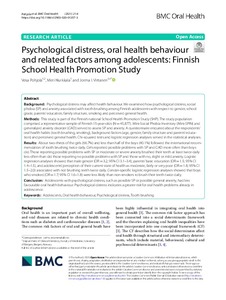| dc.contributor.author | Pohjola Vesa | |
| dc.contributor.author | Virtanen Jorma I. | |
| dc.contributor.author | Nurkkala Meri | |
| dc.date.accessioned | 2022-10-28T13:21:10Z | |
| dc.date.available | 2022-10-28T13:21:10Z | |
| dc.identifier.uri | https://www.utupub.fi/handle/10024/164565 | |
| dc.description.abstract | <p><strong>Background: </strong>Psychological distress may affect health behaviour. We examined how psychological distress, social phobia (SP) and anxiety associated with tooth brushing among Finnish adolescents with respect to gender, school grade, parents' education, family structure, smoking and perceived general health.</p><p><strong>Methods: </strong>This study is part of the Finnish national School Health Promotion Study (SHP). The study population comprised a representative sample of Finnish 15-year-olds (N = 45,877). Mini-Social Phobia Inventory (Mini-SPIN) and generalized anxiety disorder (GAD) served to assess SP and anxiety. A questionnaire enquired about the respondents' oral health habits (tooth brushing, smoking), background factors (age, gender, family structure and parents' education) and perceived general health. Chi-squared tests and logistic regression analyses served in the statistical analyses.</p><p><strong>Results: </strong>About two-thirds of the girls (66.7%) and less than half of the boys (40.1%) followed the international recommendation of tooth brushing twice daily. Girls reported possible problems with SP and GAD more often than boys did. Those reporting possible problems with SP or moderate or severe anxiety brushed their teeth at least twice daily less often than did those reporting no possible problems with SP and those with no, slight or mild anxiety. Logistic regression analyses showed that male gender (OR = 3.2; 95% CI 3.1-3.4), parents' basic education (OR = 1.5; 95% CI 1.4-1.5), and adolescents' perception of their current state of health as moderate, fairly or very poor (OR = 1.8; 95% CI 1.5-2.0) associated with not brushing teeth twice daily. Gender-specific logistic regression analyses showed that boys who smoked (OR = 1.7; 95% CI 1.6-1.8) were less likely than non-smokers to brush their teeth twice daily.</p><p><strong>Conclusion: </strong>Adolescents with psychological distress, such as possible SP or possible general anxiety, had less favourable oral health behaviour. Psychological distress indicates a greater risk for oral health problems already in adolescence.</p> | |
| dc.language.iso | en | |
| dc.publisher | BMC | |
| dc.title | Psychological distress, oral health behaviour and related factors among adolescents: Finnish School Health Promotion Study | |
| dc.identifier.url | 10.1186/s12903-020-01357-3 | |
| dc.identifier.urn | URN:NBN:fi-fe2021042826589 | |
| dc.relation.volume | 21 | |
| dc.contributor.organization | fi=hammaslääketieteen laitos yhteiset|en=Institute of Dentistry| | |
| dc.contributor.organization-code | 2607500 | |
| dc.converis.publication-id | 50935127 | |
| dc.converis.url | https://research.utu.fi/converis/portal/Publication/50935127 | |
| dc.identifier.jour-issn | 1472-6831 | |
| dc.okm.affiliatedauthor | Virtanen, Jorma | |
| dc.okm.discipline | 313 Dentistry | en_GB |
| dc.okm.discipline | 313 Hammaslääketieteet | fi_FI |
| dc.okm.internationalcopublication | international co-publication | |
| dc.okm.internationality | International publication | |
| dc.okm.type | Journal article | |
| dc.publisher.country | United Kingdom | en_GB |
| dc.publisher.country | Britannia | fi_FI |
| dc.publisher.country-code | GB | |
| dc.relation.articlenumber | 6 | |
| dc.relation.doi | 10.1186/s12903-020-01357-3 | |
| dc.relation.ispartofjournal | BMC Oral Health | |
| dc.relation.issue | 1 | |
| dc.year.issued | 2021 | |
